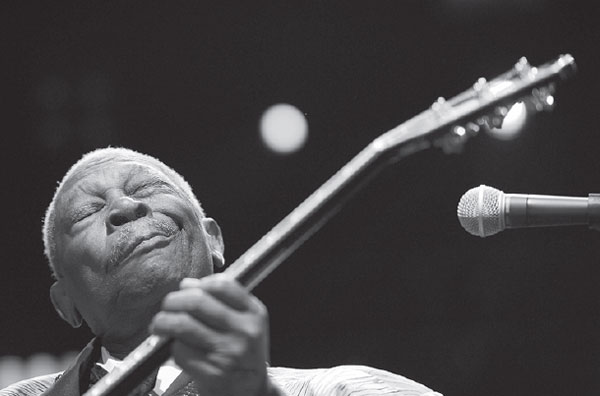Blues legend B.B. King dies at 89
Blues legend B.B. King, who took his music from rural juke joints to the mainstream and inspired generations of guitarists from Eric Clapton to Stevie Ray Vaughan, has died at age 89.
King, who will always be associated with the trademark black Gibson guitars he christened Lucille, died in a hospice in Las Vegas on Thursday night, his attorney said.
News of his death, confirmed on a Facebook page linked to the website of King's daughter Claudette, triggered shock waves across social media, with stars from the music world lining up to pay tribute.
|
US blues artist B.B. King performs during the 45th Montreux Jazz Festival in Montreux, Switzerland, in 2011. B.B. King, seen as one of the greatest blues guitarists, died at the age of 89 in Las Vegas, Nevada. Fabrice Coffrini / AFP |
King was hospitalized in April for a few days after suffering from dehydration related to Type 2 diabetes. In May he said in a Facebook post that he was in hospice care.
Born on a plantation to sharecropper parents, King outlived all his fellow post-World War II blues greats - Muddy Waters, Howlin' Wolf, Jimmy Reed, Lightnin' Hopkins and John Lee Hooker - to see the rough music born in the cotton fields of the segregated South reach a new audience.
"Being a blues singer is like being black twice," King wrote in his autobiography, Blues All Around Me, of the lack of respect the music got compared with rock and jazz.
"While the civil rights movement was fighting for the respect of black people, I felt I was fighting for the respect of the blues."
Among the best
In 2003, Rolling Stone magazine's list of the 100 greatest guitarists of all time ranked King at No 3, behind only Jimi Hendrix and Duane Allman.
Rocker Bryan Adams said on Twitter King was "one of the best blues guitarists ever, maybe the best. He could do more on one note than anyone"
In a similar vein, Lenny Kravitz tweeted: "BB, anyone could play a thousand notes and never say what you said in one."
Born Riley B. King on Sept 16, 1925 in Itta Bena, Mississippi, he began learning guitar as a boy and sang in church choirs.
After World War II army service, King sang on street corners to pick up money. In 1947 he hitchhiked to Memphis, Tennessee, where he learned from and played with his cousin, revered blues guitarist Bukka White.
King went from touring black bars and dance halls in the 1940s and '50s to headlining an all-blues show at New York's Carnegie Hall in 1970 and recording with the likes of Clapton and U2 in the '90s.
He had a deep, resonant singing voice and, despite having what he called "stupid fingers", an immediately recognizable guitar sound.
His unique style of trilling the strings with a fluttering left-hand vibrato, which he called "the butterfly", delivered stinging single-note licks that brimmed with emotion and helped shape early rock.
(China Daily 05/16/2015 page11)















